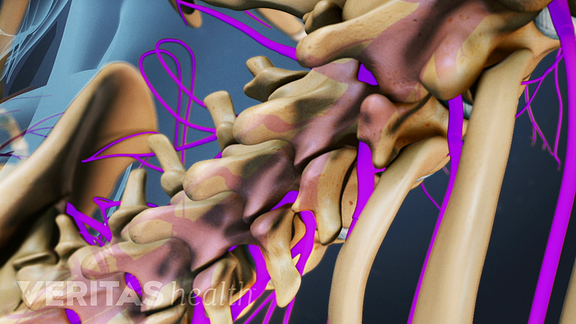All About Neuropathy And Chronic Back Pain
By Ralph F. Rashbaum, MD Peer Reviewed 2017
Neuropathic pain is distinct from other types of pain. If a person breaks a bone, pain signals are carried via nerves from the site of the trauma to the brain. With neuropathic pain, however, pain signals originate in the nerves themselves.

Neuropathic pain often occurs as a result of nerve damage or dysfunction. Read more details on how it affects Spinal Cord and Spinal Nerve Roots
How Neuropathic Pain Develops
In many cases, the nerves become damaged or dysfunctional after responding to an injury or trauma, causing hypersensitivity to pain. The nerves then send faulty signals of pain even when the injury has healed. The initial injury can occur in either the peripheral or central nervous system.
See Pain Signals to the Brain from the Spine
Neuropathic pain, or neuropathy, is a chronic condition, meaning it does not go away. Instead, the pain becomes the disease process. The terms sensory peripheral neuropathy and peripheral neuritis are sometimes used to describe neuropathy affecting the peripheral nerves.
See Chronic Pain As a Disease: Why Does It Still Hurt?
An estimated 7 to 10% of people have neuropathic pain.1 This article examines neuropathy and chronic back pain, and how the two conditions are related.
In This Article:
All About Neuropathy And Chronic Back Pain
Understanding Neuropathy Symptoms
Anatomy Of Nerve Pain
Types of Back Pain
Causes of Neuropathic Pain Video
Video: Understanding Different Types of Back Pain
When Back Pain Causes Neuropathy
Neuropathy can result from any type of pain that compresses or impinges on a nerve. A herniated disc, for example, could press against a nearby nerve, causing pain. Neuropathic pain originating from the back or spine may include:
Chronic pain radiating down the leg (lumbar radiculopathy, or sciatica)
Chronic pain radiating down the arm (cervical radiculopathy)
Pain following back surgery that starts gradually and persists, commonly called failed back surgery syndrome
See Radiculopathy, Radiculitis and Radicular Pain
Diabetes and regional pain syndrome (RPS), are common causes of neuropathy. Additional causes of include injury, disease, infection, exposure to toxins, and substance abuse. It is not always possible to pinpoint the cause.
Why Early Treatment is Crucial
Early treatment is important, since more aggressive treatment may be needed if symptoms are not addressed soon.
See Treatment Options for Neuropathic Pain
Over time, exposure to significant pain can cause changes to the central nervous system that make the body become more sensitive to even slight touch—a phenomenon known as central sensitization.
See Medications for Neuropathic Pain
As with other types of chronic pain, delays in treatment may also make other health problems more likely. Depression, anxiety, difficulty sleeping, and an inability to work and take part in other activities are some health issues associated with untreated neuropathy.
See Additional Treatments for Neuropathic Pain
References:
Van hecke O, Austin SK, Khan RA, Smith BH, Torrance N. Neuropathic pain in the general population: a systematic review of epidemiological studies. Pain. 2014;155(4):654-62.
https://www.spine-health.com/conditions/chronic-pain/all-about-neuropathy-and-chronic-back-pain

No comments:
Post a Comment
All comments welcome but advertising your own service or product will unfortunately result in your comment not being published.